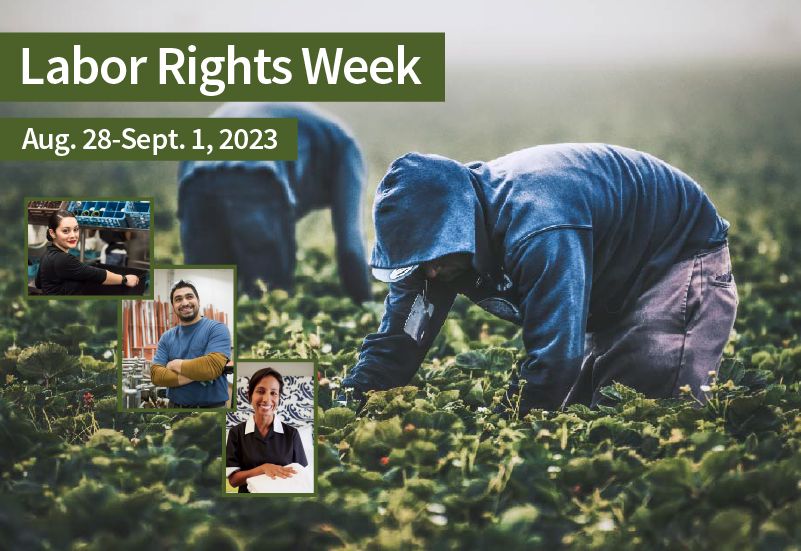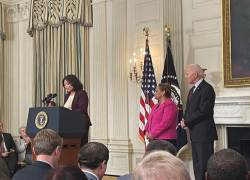En español

During Labor Rights Week 2023, Aug. 28-Sept. 1, we’re getting the word out that ALL workers in the United States have the same right to a safe and healthy workplace and a just day’s pay, as well as the right to report violations of labor laws without fear of retaliation. And these worker protections apply to everyone, regardless of immigration status.
Too often, workers endure abuses at work for fear that if they speak up, they could be fired or even deported. These threats to workers’ rights are unacceptable, and they also make it more difficult for us to enforce the law, because the Department of Labor relies on workers coming forward.
Held during the week leading up to Labor Day, Labor Rights Week is when we join with the Mexican Embassy and its 52 consulates, other foreign embassies, community and faith-based organizations, and federal and state government partners to promote fundamental labor rights. We are grateful for these partnerships with organizations that have the trust of the workers we seek to serve.
In addition to participating in local outreach and education events, here are three ways you can take action:
- Learn about workers’ rights. Knowledge is power and workers who know their rights are empowered workers. We have many resources for workers. As someone who has advocated for workers my entire career, one of my top priorities has been to make these resources more accessible, understandable, and easy to use—and available in multiple languages. A good starting point is dol.gov/LaborRightsWeek. At worker.gov, you will also find information organized from the perspective of workers, with a Spanish language option for the entire website and additional languages being added soon. For any questions or help with rights at work, including how to file a complaint, call us at 1-866-487-2365. We provide assistance in many languages.
- Download our Labor Rights Week social media toolkit. From being paid on time to staying safe in the heat, our messages in English and Spanish inform and educate workers about critical workplace protections.
- Find out if we have collected wages for you or someone you know. One of the Department of Labor’s fundamental roles is to combat wage theft. If we investigate a workplace and find that workers have not been paid all the wages they are owed, we can recover those wages. In many cases, we get those wages into workers’ hands as soon as we recover them, but sometimes, we must find the workers first. We hold that money for three years while we try to locate workers. After three years, we are required to send the money to the U.S. Treasury. Search Workers Owed Wages — available in English and Spanish — to see if you or someone you know has wages we collected.
Here at the Department of Labor, we’re committed to ensuring that workers understand their rights and that employers understand their responsibilities. Too many workers endure dangerous or unfair conditions, or are afraid to speak up for fear of losing their jobs or being deported. And too many aren’t aware of their rights because their employer failed to provide that information in a language they understand, even though it’s required by law that they do so.
The Biden-Harris administration is committed to empowering workers and promoting their ability to exercise their rights at work. We stand with our partners this Labor Rights Week as we fight for every worker’s right to come forward to improve their working conditions.
We also recognize many employers comply with the law and all employers benefit from robust enforcement — but employers who exploit their workers should never have a competitive advantage.
We hope you’ll stand with us this Labor Rights Week to promote dignity, equity and justice for all workers.
Julie Su is the acting secretary of labor.
Editor’s note: The U.S. Department of Labor’s Consular Partnership Program is coordinated by the Bureau of International Labor Affairs. This program involves collaborations with local consulates through field offices of agencies such as the Occupational Safety and Health Administration and the Wage and Hour Division. Its goal is to educate and inform foreign workers about their workplace rights and employers their responsibilities, on laws including those related to workplace safety and health, proper payment of wages, work hours and other employment matters that individuals from other countries encounter while working in the U.S.
Semana de los Derechos Laborales: 3 maneras de involucrarse
Por Julie Su

Durante la Semana de los Derechos Laborales 2023, del 28 de agosto al 1 de septiembre, estamos corriendo la voz de que TODOS los trabajadores en los Estados Unidos tienen derecho a un lugar de trabajo seguro y saludable y a un salario justo, así como al derecho a denunciar violaciones de leyes laborales sin temor a represalias. Estas protecciones se aplican a todos, independientemente de estatus migratorio.
Con demasiada frecuencia, trabajadores sufren abusos en el trabajo por temor a que, si hablan, puedan ser despedidos o incluso deportados. Estas amenazas a los derechos laborales de trabajadores son inaceptables, y también es difícil para nosotros a hacer cumplir la ley, porque el Departamento de Trabajo depende de que los trabajadores se presenten.
Celebrada durante la semana antes del Día del Trabajo, la Semana de los Derechos Laborales es cuando nos unimos a la Embajada de México y sus 52 consulados, otras embajadas, organizaciones comunitarias y religiosas, y socios del gobierno federal y estatal para promover los derechos laborales. Estamos agradecidos por estas asociaciones con organizaciones que tienen la confianza de los trabajadores a quienes buscamos a servir.
Además de participar en eventos locales informativos y educativos, aquí hay tres maneras en que puede tomar usted medidas:
1. Aprenda sobre los derechos de los trabajadores. El conocimiento es poder y los trabajadores que conocen sus derechos son trabajadores empoderados. Tenemos varios recursos para los trabajadores. Como alguien que ha abogado por los trabajadores durante toda mi carrera, una de mis principales prioridades ha sido hacer que estos recursos sean más accesibles, comprensibles y fáciles de usar, y disponibles en varios idiomas. Un buen punto de partida es dol.gov/LaborRightsWeek. En worker.gov, también encontrará información organizada desde la perspectiva de los trabajadores, con una opción en español para el sitio web y pronto se agregarán idiomas adicionales. Para cualquier pregunta o ayuda con los derechos en el trabajo, incluyendo cómo presentar una queja, llámenos al 1-866-487-2365. Brindamos asistencia en muchos idiomas.
2. Descargue nuestro kit para la Semana de los Derechos Laborales. Desde que se les pague a tiempo hasta mantenerse seguros en el calor, nuestros mensajes en inglés y español informan y educan a los trabajadores sobre las protecciones críticas en el lugar de trabajo.
3. Averigüe si hemos colectado salarios para usted o alguien que conoce. Una de las funciones del Departamento de Trabajo es combatir el robo de salarios. Si investigamos un lugar de trabajo y descubrimos que a los trabajadores no se les han pagado todos los salarios que se les deben, podemos recuperar esos salarios. En muchos casos, ponemos esos salarios en manos de los trabajadores tan pronto como los recuperamos, pero a veces, debemos encontrar a los trabajadores primero. Retenemos ese dinero durante tres años mientras tratamos de localizar al trabajador. Después de tres años, estamos obligados a enviar el dinero al Tesoro de los Estados Unidos. Buscar Workers Owed Wages en inglés y español vea si usted o alguien que conoce tiene salarios que cobramos por usted.
El Departamento de Trabajo está comprometido a garantizar que los trabajadores entiendan sus derechos y que los empleadores entiendan sus responsabilidades. Demasiados trabajadores corren el riesgo de soportar condiciones peligrosas o injustas, temer de hablar por temor a perder sus empleos o ser deportados. Y de no ser conscientes de sus derechos porque su empleador no proporcionó esa información en un idioma que entienden, a pesar de que la ley lo requiere.
La administración Biden-Harris está comprometida a empoderar a los trabajadores y promover su capacidad para ejercer sus derechos en el trabajo. Estamos con nuestros socios en esta Semana de los Derechos Laborales mientras luchamos por el derecho de todos los trabajadores a presentarse para mejorar sus condiciones de trabajo. También reconocemos que muchos empleadores cumplen con la ley y todos los empleadores se benefician de una aplicación sólida, pero los empleadores que explotan a sus trabajadores nunca deberían tener una ventaja competitiva.
Esperamos que nos acompañe esta Semana de los Derechos Laborales para promover la dignidad, la equidad y la justicia para todos los trabajadores.
Julie Su es la secretaria interina de trabajo.
Nota editorial: El Programa de Asociación Consular del Departamento de Trabajo es coordinado por la Oficina de Asuntos Laborales Internacionales. Este programa es en colaboración con consulados locales a través de oficinas locales de agencias como la Administración de Seguridad y Salud Ocupacional y la División de Horas y Salarios. Su objetivo es educar e informar a los trabajadores extranjeros sobre sus derechos y responsabilidades en el lugar de trabajo, sobre las leyes, incluidas las relacionadas con la seguridad y la salud en el lugar de trabajo, el pago adecuado de salarios, horas de trabajo y otros asuntos de empleo que las personas de otros países encuentran mientras trabajan en los Estados Unidos.

 U.S. Department of Labor Blog
U.S. Department of Labor Blog







